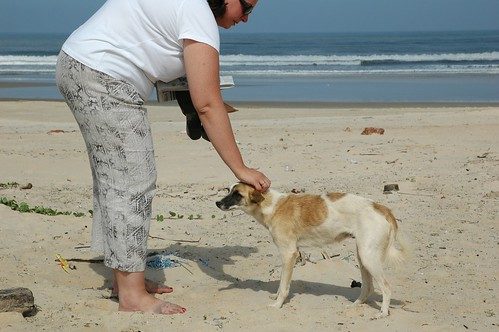《人道犬只种群管理指南》是从事犬只种群管理的组织和当局的重要资源。我们的综合框架概述了旨在改善狗福利、公共卫生和环境条件的有效和人道策略。

在摩洛哥人道协会 (HSM),我们致力于促进人道且有效的伴侣动物种群管理。我们的组织强调分享知识和经验以改进全国各地实践的重要性。这一更新的指南建立在以前的框架之上,反映了我们对犬类种群动态和管理策略的理解的进步。
我们的指南是专门为参与犬只数量管理的摩洛哥政府机构和非政府组织 (NGO) 设计的。我们的目标是确保干预措施人道、有效和可持续,最终为狗和社区带来更好的结果。
我们强调几个关键组成部分,它们构成了有效和人道的犬只种群管理的基础。每个组成部分都在确保我们的干预措施不仅有效而且符合道德规范方面发挥着至关重要的作用。
犬只数量管理原则
我们制定基本原则来指导我们对犬只数量管理的所有干预措施。了解狗的种群动态——包括出生率、死亡率和狗的社会行为等因素——至关重要。通过关注这些动态,我们可以识别并解决人口过剩的根本原因,而不是仅仅对流浪狗等可见问题做出反应。
主要原则包括:
– 整体方法:我们在干预措施中考虑涉及狗、人类和环境的整个生态系统。
– 社区参与:当地社区的参与对于可持续管理至关重要,因为社区态度显着影响狗的福利。
– 循证实践:我们利用数据和研究来指导我们的决策,确保策略有效并适应不断变化的情况。
评估、设计和评估
我们认识到在设计干预措施之前进行彻底评估以了解当地情况的重要性。我们的系统方法包括:
– 数据收集:我们通过调查、观察和社区反馈收集定量和定性数据,以了解狗的种群及其动态。
– 识别问题:分析数据使我们能够查明社区内与狗种群相关的具体问题,例如高遗弃率或兽医护理不足。
– 量身定制的解决方案:我们设计针对具体情况的干预措施,以满足每个社区的独特需求,同时保持资源效率。
评估对我们来说是一个持续的过程;它使我们能够监控进展并根据结果调整策略。这种迭代方法有助于随着时间的推移完善我们的干预措施,最大限度地提高其有效性。
犬只数量管理 (DPM) 系统
我们详细介绍了全面的犬只种群管理 (DPM) 系统的结构,概述了建立有效的 DPM 框架的必要基础:
– 立法和执法:强有力的法律框架对于规范狗的所有权、繁殖实践和负责任的宠物所有权至关重要。
– 社区参与:我们与当地社区建立伙伴关系,以促进合作和对管理举措的支持。
– 倡导:提高人们对负责任的养狗和福利问题的认识,有助于赢得公众对我们管理工作的支持。
我们的 DPM 系统包括基本服务,例如绝育计划、获得兽医护理以及旨在促进宠物主人负责任行为的教育活动。
启用人性化的 DPM
我们强调创造有利于人道犬只种群管理的环境所必需的组成部分。关键要素包括:
– 治理:建立明确的治理结构可确保参与犬只种群管理的各个利益相关者之间的问责制和有效协调。
– 资金:确保充足的财政资源对于有效实施我们的计划至关重要。这可能涉及与政府机构、非政府组织和私人实体的伙伴关系。
– 培训和支持:我们为参与犬只管理的人员提供培训,确保他们具备有效实施人道实践所需的知识和技能。
此外,我们还强调控制和消除狂犬病的重要性,将其作为管理犬类种群同时保障公众健康的整体方法的一部分。
结论
我们的指南强调需要采取多方面的方法来管理犬只数量,在满足社区需求的同时优先考虑对动物的人道待遇。通过遵守这些关键组成部分(管理原则、全面的评估流程、强大的 DPM 系统和有利的环境),我们可以努力寻求使狗和人类社区都受益的可持续解决方案。
有关实施这些战略或与我们合作开展旨在改善摩洛哥狗福利的举措的更多信息,请联系我们。我们可以共同通过负责任的犬只数量管理对我们的社区产生重大影响!
改善狗福利,公共卫生和安全的国际标准
狗种群管理(DPM)是指旨在改善狗的福利,减少它们可能提出的问题并与人及其环境建立和谐共存的整体方法...
领导和协调国家DPM努力,建立治理,支持立法,执行,资助,培训和沟通计划。
组织,实施和监督与主管当局协调的DPM计划。
负责当地实施和执行狗的拥有立法。
负责狗福利并遵守法规和建议。
支持计划开发,提供专业知识并代表利益相关者的利益。
立法是可持续有效的DPM计划的关键,确保尊重动物福利原则。法规可能涵盖:
请考虑捐赠以帮助我们的工作:
| 曲奇饼 | 期间 | 描述 |
|---|---|---|
| cookielawinfo-复选框分析 | 11个月 | This cookie is set by GDPR Cookie Consent plugin. The cookie is used to store the user consent for the cookies in the category "Analytics". |
| cookielawinfo-复选框功能 | 11个月 | The cookie is set by GDPR cookie consent to record the user consent for the cookies in the category "Functional". |
| cookielawinfo-复选框-必要 | 11个月 | This cookie is set by GDPR Cookie Consent plugin. The cookies is used to store the user consent for the cookies in the category "Necessary". |
| cookielawinfo-复选框-其他 | 11个月 | This cookie is set by GDPR Cookie Consent plugin. The cookie is used to store the user consent for the cookies in the category "Other. |
| cookielawinfo-复选框性能 | 11个月 | This cookie is set by GDPR Cookie Consent plugin. The cookie is used to store the user consent for the cookies in the category "Performance". |
| 查看的_cookie_政策 | 11个月 | 该cookie由GDPR Cookie Consent插件设置,用于存储用户是否同意使用cookie。它不存储任何个人数据。 |
在继续您的收养申请之前,请查看并接受我们的数据处理惯例:
笔记: By clicking "I Agree & Continue", you will be redirected to an external application form. This tracking system logs your interest but does not capture data from the external form.
在继续您的收养申请之前,请查看并接受我们的数据处理惯例:
笔记: By clicking "I Agree & Continue", you will be redirected to an external application form. This tracking system logs your interest but does not capture data from the external form.